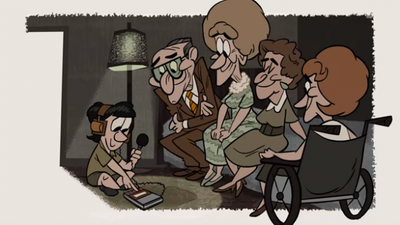DOWNLOAD VIDEO
The play “Disgraced”
shows
the life of a Pakistani-American who has drifted away from his family’s religious Muslim practices but still feels some loyalty to his heritage—while knowing that being a man of Muslim descent makes him a target in America.
In one scene, the main character explains to another character that he volunteers for security checks at airports, knowing that some other Americans’ prejudices makes them afraid of him.
The play aims to ask tough questions about what it means to identify as a Muslim in modern-day America, as well as how the Muslim identity defines itself in relation to Western culture, playwright Ayad Akhtar explains.
In the last 200 years, the Muslim identity has drawn heavily on defining itself in opposition to the West, Akhar said. This question—specifically, the question of what it means to be both Muslim and American, and how one identity influences the other—appears at both an individual and national level, he said.
“What are the overlaps? What are the contradictions? Are those contradictions real? Are they historical? Are they passed simply from parent to child, or is it something much larger?” he said.
The play earned the 2013 Pulitzer Prize for Akhar, who grew up in a secular Muslim family in Milwaukee.
His other work shows the perspective of characters that are dealing with this dynamic. He previously wrote the movie “The War Within” about a Pakistani student who stages an attack on New York after a CIA interrogation.
For Akhar, live theater is particularly effective in helping to explore questions of identity. The relationship between a cast and an audience creates a shared experience that allows the group to explore these ideas more deeply than they could on their own, he said.
Warm up questions
- Have you ever been to the theater or participated in a play? What did or didn’t you like about it?
- What is the “American Dream?” Where do you think this concept originated? Do you think it still holds true for everyone in the United States? Explain your answer.
Critical thinking questions
- What does it mean to have a sense of your own identity? When and how do you think someone forms their identity? How is your identity related to your culture? What challenges might make identity formation difficult? For example, the star of the play is a Muslim and an American–how might that make things challenging?
- Think about your experience being a member of the audience while watching a play or some other type of live performance (such as a pep rally) or watching a movie in a theater with lots of other people around. How is that experience different from watching something by yourself?
- Playwright Ayad Akhtar describes the experience of theatre: "At its best, what the theater does is, it gathers us together. We, social herding animals, arrive together into a room, and we behold something that actually happens before us, not something mediated to us by a screen, but the presence of live performers, which hearkens back to a kind of experience of a ritual, and an experience of one mind, one body, a kind of communion that happens in the audience between audience and performers that allows us, reaches into us, where we can experience things more deeply than we can individually." Do you agree with his statement based on your own personal experiences? Does it make you think differently about seeing a play? Explain your answers.


